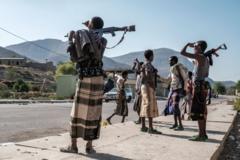Ethiopia finds itself on the precipice of renewed conflict following the disturbing announcement that the electoral board has revoked the legal status of the Tigray People's Liberation Front (TPLF), the primary opposition party in the Tigray region. The TPLF has called upon the African Union (AU) to facilitate dialogue between the federal government and the party in the wake of this drastic decision. The recent ban has been labeled as "dangerous" by the TPLF, and as a "serious threat" to the peace agreement signed in 2022 which concluded two years of violent conflict in Northern Ethiopia.
The party, which has governed Tigray and previously held power across the nation, faced deregistration due to its failure to conduct internal elections. This directive comes amidst persistent political strife in Tigray as the country edges closer to nationwide elections expected by June 2024. The TPLF was once the dominant force that led a coalition to overthrow the ruling regime in 1991 but saw its influence dwindle following the rise of Prime Minister Abiy Ahmed in 2018.
The TPLF has asserted that the National Election Board of Ethiopia's decision effectively undermines the interim administration established in Tigray in 2023, a provision of the Pretoria peace agreement. Tensions have escalated as internal divisions within the TPLF have hindered its party functions. The board's decision has provoked a strong reaction from the TPLF, leading to a call for the AU to intervene and to pressure the federal government to reinstate the TPLF's political activities.
In a letter addressed to the AU, the TPLF emphasized that the ban "denies the TPLF a right it had reclaimed through the Pretoria Agreement," warning that such actions jeopardize the framework of peace essential to the region. TPLF deputy chairman Ammanuel Assefa voiced concerns that the electoral board's decision could have far-reaching consequences for the peace deal, stating, "This isn't just about TPLF, but also about undermining what people have sacrificed."
The urgency of the situation is highlighted by the slow progress in fulfilling the terms of the peace agreement, particularly regarding the resettlement of over one million individuals displaced by the previous violent conflict. International observers, including officials from the US, UK, and EU, have expressed alarm over rising tensions, underscoring the necessity to avoid a return to violence in the region.



















